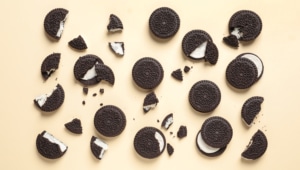Honey: 6 Health Benefits & 6 Varieties

Honey is a syrupy liquid, which will win you over with a whole range of health benefits. We explain to you exactly how honey works in your body – especially during pregnancy. In addition, we introduce you to the different varieties and give tips on buying.
Whether honey-mustard dressing or strawberry jam bread with honey – the processed plant nectar can be used in every kitchen in many ways. On top of that, thanks to the nutrients it contains, using it can also do something good for your health.
Facts about Honey

Facts about honey
As early as the Stone Age, people were using honey as one of the few sweet foods – this is shown by cave paintings as well as analyses of Stone Age wax remains.
In addition, the Greek physician Hippocrates of Kos recommended honey as a remedy for various diseases such as fever and gout.
Honey is composed basically of various types of sugar on the one hand and water on the other. It consists of about 40 percent fructose and about 30 percent glucose. Thus, the sweetener is suitable as a natural sugar substitute.
How Bees Make Honey

How bees make honey
The liquid syrup is created primarily through the hard work of honey bees. Namely, with their proboscises, they suck the honeydew (a sugary excretory product) or nectar from the flowers of the respective plants.
The bees store the collected nectar in their so-called honey stomach. Once at the hive, the contents of the stomach are transferred to the hive bees.
Through the repeated regurgitation and transfer from bee to bee, the nectar is enriched with enzymes and proteins, among other things. This, along with fanning from the bees' wings, thickens the liquid – until it reaches a viscous consistency.
Nutritional Values and Calories of Honey

Nutritional values and calories of honey
The syrupy liquid hosts a number of important minerals and trace elements.
These include, for example:
- Potassium
- Magnesium
- Sodium
- Iron
Calorie-wise, however, honey doesn’t fare quite as well: calculated on 100 grams, it contains over 300 kilocalories. You can read all other important nutritional values in the following table.
| Nutrients | Per 100 gram |
|---|---|
| Energy | 306 kilocalories |
| Fat | 0 gram |
| Sugar | 82 gram |
| Carbohydrates | 75 gram |
| Protein | 0,4 gram |
| Fibre | 0 gram |
Honey in Pregnancy

Honey in pregnancy
Generally speaking, honey is almost always safe during pregnancy.
Strictly speaking, however, it is one of the animal foods that pregnant women should enjoy with caution. Untreated food, such as for example raw milk, can be contaminated with pathogens.
Honey contains listeria – bacteria that can cause the infectious disease listeriosis. However, the natural product has an antibacterial effect due to its high sugar content. This means that the listeria is inhibited from multiplying.
It is also known that honey can contain the bacterium Clostridium botulinum. Statistically, it is included in about five percent of all jars of bee honey. The spores of the bacteria are able to lodge in the infant’s intestines – so they can cause severe food poisoning.
Medical professionals call this infant botulism. The colonization of the intestine by clostridia occurs because the baby’s intestinal flora has yet to develop.
As a pregnant woman, however, you can breathe easy, because you can still eat honey.
Your system makes the bacterium harmless for you and your child through the body’s own substances and stomach acid. Remember, however: The intestine of a toddler is strong enough to defend itself independently against the clostridia only after one year of age.
To conclude: Honey in small amounts is not a problem during pregnancy and breastfeeding.
Side Effects – When Honey Can Be Bad for You

Side effects – when honey can be bad for you
There are no known side effects of honey so far. However, if you suffer from an allergy, then you may do best to avoid honey products. The reason for this is the pollen contained, which can aggravate allergy symptoms.
Similarly, if you have fructose intolerance, you might avoid honey. Those who cannot tolerate fructose are usually allergic to honey as well.
Moreover, keep in mind that honey contains quite a lot of sugar, and use it judiciously, because too much sugar is not good for you.
Health Benefits of Honey – Why Honey is Good for You

Health benefits of Honey – why honey is good for you
Honey contains a variety of ingredients. In fact, it has more than 200 different ingredients – many of which have health-promoting effects. These include enzymes, phenols and antioxidants.
This means it helps to support your body and health in many ways. Moreover, honey can also prevent some diseases.
In this chapter, we explain the effects of the natural remedy in more detail.
Provides Energy
Due to its different types of sugar, the sweetener provides you with energy over a long period of time. First, your body breaks down the contained glucose, then the fructose.
Compared to white sugar, this provides you with a constant supply of energy over a longer period of time. The remedy also contains valuable B vitamins, which help you break down carbohydrates.
Since honey is made by bees, it is an animal product. And that is the case, even though the ultimate food is purely plant-based.
If you’re vegan, bee honey is not recommended. Still, there are plenty of plant-based alternatives available to you, such as syrup made from dandelions.
Prevents Iron Deficiency

Iron deficiency
Honey contains a number of vitamins – including vitamin C.
Also known as ascorbic acid, the vitamin can help you prevent iron deficiency.
This is because it increases the absorption of plant-derived iron. Per 100 grams, honey contains about 0.5 grams of vitamin C.
If stored properly, this natural product can be stored for several years. It is best to store honey at a room temperature of 64 degrees Fahrenheit in a dry and dark environment.
However, if the honey was bottled incorrectly, it can ferment. If the liquid is spoiled, you can recognize it by the alcoholic taste and the formation of bubbles.
Honey Against Cough and Sore Throat
Also worthy of note is the effect of honey on coughs and sore throats. Particularly for respiratory tract infections, the natural remedy is readily recommended as an alternative to antibiotics.
By analyzing the current collection of studies, researchers conclude that honey can help alleviate the symptoms of cough. This includes both the frequency and severity of coughing attacks. Honey is even considered less harmful than other medicines.
For example, due to the sugar it contains, honey stimulates saliva production. The resulting moisture can then be deposited on the irritated mucous membranes and thus quickly provide relief from the symptoms.
Apart from this, scientists attribute antioxidant and antimicrobial properties to the remedy.
Promotes Regeneration

Promotes Regeneration
Honey is especially popular among endurance athletes because it supports the body’s recovery.
If you have a strenuous sports session behind you, it is worthwhile to consume honey with proteins. This combination will help you to decrease your recovery time.
Besides, your muscles will feel less stiff. The plant nectar is rich in amino acids, including arginine and glutamine. They represent important intermediates of metabolism and give honey its typical flavor.
Helps with Inflammation
Honey’s antibacterial effects have been scientifically proven. Its low pH and high sugar content make this natural remedy suitable for treating inflammatory skin problems and poorly healing wounds.
Its special enzymes have an additional disinfecting effect. For this reason, you can also use it on skin blemishes like acne or pimples.
Contrary to some sayings, you should refrain from consuming honey if you suffer from diarrhea. The syrupy liquid causes a laxative effect, increasing the pressure in your intestines. Ultimately, this leads to defecation.
Protects Against Disease

Protects against disease
It is well known that honey is very good for the immune system. According to an Austrian study, eating honey increases resistance to infections by about 40 percent.
This is due in part to the flavonoids it contains. The water-soluble plant pigments actually possess medicinal properties – they strengthen blood vessels and have antiviral effects.
In particular, medicinal honey is excellent for strengthening the immune system. It makes you catch a cold less often and feel fitter.
Unlike other types, medicinal honey is not pasteurized. Instead of pasteurization, gamma rays are used, which preserve important substances.
Whether and to what extent the home remedy helps with hemorrhoids has not yet been scientifically studied. However, some users observe a temporary relief of discomfort.
Varieties of Honey

Varieties of honey
There exists a wide range of different types of honey, which differ in taste and appearance.
We divide them into honeydew honey and blossom honey. The latter refers to those varieties that consist of flower nectar.
Honeydew, on the other hand, is the excretions of insects that suck on plants.
Acacia honey
In acacia honey, we distinguish between German acacia honey and true acacia honey. While the latter is obtained from tropical regions, the German variety comes from the acacia forests near Berlin.
The acacia honey has a high sugar content and therefore also tastes very sweet and mild. In addition, a light yellow to golden yellow color and a clear consistency are characteristic of the variety.
Manuka Honey

Manuka Honey
Manuka honey is characterized by higher effectiveness compared to the conventional variant.
That is why the indigenous people of New Zealand have been using this natural product as a traditional remedy for a long time.
The strength of the effect of Manuka honey depends mainly on its content of methylglyoxal (MG). The substance is formed as a natural metabolic product in the bee’s stomach.
Conventional honey has an MGO content of one to two milligrams per kilogram of product. Manuka honey, on the other hand, has 300 to 700 milligrams.
Forest Honey
Forest honey beguiles with its spicy taste and dark brown color. The variety is created on the basis of spruce or fir trees, among others.
So, unlike other kinds of honey, it is not flower nectar, but secretions of plants and excretions of insects that feed on plant sap.
Lavender honey

Lavender Honey
Lavender honey is a rarity that usually comes from French Provence.
In order for the syrup-like liquid to be called lavender honey, it must consist of at least 60 percent nectar from the lavender plant.
In terms of taste, however, the luxury product is not only reminiscent of lavender – it also has a spicy and fruity notes. This makes it particularly useful in refining desserts or as a spread.
Organic Honey
Unlike conventional honey, the organic variety is subject to separate regulations. Although the bees collect the nectar from the wild, the beekeeper can influence the composition of the final product.
For example, to ensure that as few pesticides as possible end up in the food product, the beekeeper must locate his apiaries so that predominantly organic wild plants and crops grow within a three-kilometer radius.
In addition to the choice of location, the beekeeper must also pay attention to how the bees are kept. The animals may only be kept in hives made of natural raw materials such as wood or straw. So, apart from the quality of the product, a beekeeper must also pay attention to environmentally friendly and sustainable production.
Raw Honey

Raw honey
Raw honey has a thicker and more opaque consistency compared to ordinary honey. This is due to the fact that the two types of honey are produced quite differently.
Raw honey is taken straight from the beehive. It can be bottled immediately after being strained. Conventional honey is heated to the point of pasteurization, raw honey on the other hand is not pasteurized. Consequently, it is purer than processed honey.
Raw honey does not contain pesticides, herbicides, chemicals or pollutants.
Overall, raw honey is healthier than processed alternatives. This is because the pasteurization and filtration process can filter out helthy nutrients such as vitamins and minerals. Unhealthy additives such as sweeteners are also sometimes added.
Normally, raw honey is not filtered. However, there is a filtered version as well.
Since honey a high content of glucose, it tends to form sugar crystals.
Crystal formation is especially likely if you store the product in a cool environment. Certain varieties such as canola or linden honey also tend to form crystals more readily. Forest and acacia honey, on the other hand, remain liquid longer.
Honey as a Home Remedy

Honey as a home remedy
In addition to the proven health benefits, some mothers swear by honey as a home remedy.
As a time-tested home remedy, you can use honey in many different ways. We will introduce you to the two most popular ways of using it in this chapter.
Onion Juice with Honey
For coughs and colds, the use of onion juice with honey is worthwhile. This is a kind of natural cough syrup.
And this is how you make it:
-
- Put one finely chopped onion in a cup.
- Add two tablespoons of honey. Make sure it is sufficiently liquid.
- Let the mixture infuse overnight.
- The next morning, pour off the liquid and continue to use.
Hot Milk with Honey

Hot milk with honey
Those who have trouble sleeping like to reach for a glass of hot milk mixed with a little honey.
Some say that the tryptophan contained in the milk causes the sleep hormone melatonin to be produced in the brain. The honey prompts your body to release more insulin, which can improve the absorption of tryptophan.
In principle, this is all true, but milk contains too little tryptophan to cause the sleep-promoting effect.
Researchers suspect that this is more of a placebo effect. Nevertheless, hot milk with honey is good for sore throats. Both foods have a positive effect on the immune system and salivation.
How to Buy Honey

Buy Honey
To make sure your next honey experience is a real treat, you should pay attention to some quality features before buying.
First and foremost, it’s important that you reach for glass packaging and avoid plastic. Plastic is not only bad for the environment, but it can also contain toxic substances that then accumulate in the product.
Since it is a natural product, the pollen and wax contained in honey provide a natural cloudiness. A clear liquid, on the other hand, is an indication that the product has been heated – which ultimately results in the loss of nutrients.
You should also make sure that there is no watery layer on the processed nectar. This, in turn, indicates a lack of stirring during production and is associated with a loss of flavor.
It is also worth reaching for organically produced plant nectar. In fact, the organic seal of approval ensures that there are no sources of pollution at the site of the hives that affect the final product or the bees.
In small quantities, the natural product is not harmful to adult dogs. However, you should not feed it to puppies. This is because it is often contaminated with clostridia, which can cause poisoning in young dogs.





